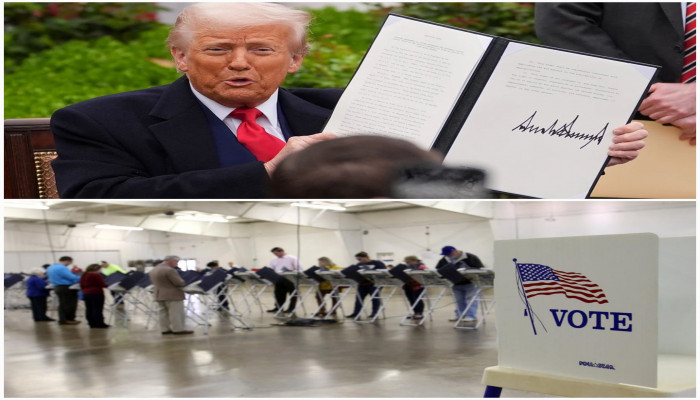19 States file lawsuit to block Trump's executive order on overhauling US election process
- In Reports
- 01:05 PM, Apr 04, 2025
- Myind Staff
President Donald Trump’s recently signed executive order, aimed at overhauling the U.S. election process, is now facing legal challenges. Democratic officials from 19 states have filed a lawsuit to block the order, arguing that it is unconstitutional and infringes on states' rights to manage their own elections. The executive order introduces stricter election regulations, requiring voters to provide documentary proof of citizenship during registration and ensure all ballots are received by Election Day. It also mandates state cooperation with federal agencies in sharing voter lists and prosecuting election-related crimes. States that fail to comply could face funding cuts.
The Democratic attorneys general from various U.S. states, who have challenged the order in court, argue that individual states have significant authority in determining how elections are conducted within their jurisdictions.
In court documents cited by the Associated Press, they stated, “The President has no power to do any of this…The Elections EO is unconstitutional, anti-democratic, and un-American.”
A group of 19 states has filed a lawsuit in the US District Court in Massachusetts, challenging the President’s authority over election procedures. The states involved in the lawsuit include Arizona, California, Colorado, Connecticut, Delaware, Hawaii, Illinois, Maine, Maryland, Massachusetts, Michigan, Minnesota, Nevada, New Jersey, New Mexico, New York, Rhode Island, Vermont and Wisconsin. The lawsuit argues that the US President lacks the constitutional power to modify state election processes.
While Congress has the authority to establish or amend election regulations for federal elections, it cannot interfere with how states administer them. The states maintain the exclusive right to set their own election rules, including determining the time, place, and manner of elections.
According to the Associated Press, New York Attorney General Letitia James stated, “We are a democracy, not a monarchy – and this executive order is an authoritarian power grab.” Meanwhile, Reuters reported California Attorney General Rob Bonta’s statement, “Neither the Constitution nor Congress authorises the president's attempted voting restrictions…We will not be bullied by him.”
The latest lawsuit primarily challenges the executive order signed on March 25, arguing that it undermines state authority over election processes. Earlier lawsuits had raised concerns that the order could lead to voter disenfranchisement.
Under the new directive, citizens must provide official proof of citizenship to register to vote. However, the lawsuits highlight that millions of eligible voters may not possess the required documents. Currently, voters are required to confirm their citizenship under the risk of perjury.
The order specifies acceptable forms of proof, including a U.S. passport, a REAL ID-compliant driver’s license that explicitly “indicates the applicant is a citizen," or a valid photo ID accompanied by additional proof of citizenship. Democrats argue that many American citizens lack passports or access to essential documents like birth certificates, making the new requirement a potential barrier to voting.







Comments